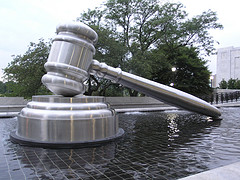The Gospel for April 3, 2011 is John 9:1-41 (yep, it is a long one). Jesus angers the pharisees by healing a blind man on the Sabbath. The high priests are outraged because they see Jesus as someone who undermines their authority and performs miracles without their approval. But Jesus says that He came to open the eyes of the spiritually blind while also blinding those who see through a lens of self-righteousness like the pharisees. We remember in The Second Glorious Mystery of the rosary, The Ascension, that Jesus will one day judge us and so we must not be blind to His teachings.
The pharisees question nearly all of Jesus’ miracles throughout the Gospel and the healing of the blind man is no different. They throw out the usual accusations — Jesus must derive His power from Satan or that He is not sent from God since He disobeys the Mosaic laws. Each time the pharisees question Jesus they end up embarrassing themselves as Jesus points out the flaws to their blind adherence to the Mosaic Law. You would think they would have learned their lesson the first couple of times Jesus set them straight. By interrogating the blind man, his family, and Jesus we get a sense of the pharisees’ growing frustration with Jesus since He threatens their authority. Like modern-day politicians, the pharisees’ goal is not to show God’s truth but keep as much earthly power as possible.
Jesus’ response to the pharisees’ criticism is found in verses 39-41:
Then Jesus said, “I came into this world for judgment, so that those who do not see might see, and those who do see might become blind.” Some of the Pharisees who were with him heard this and said to him, “Surely we are not also blind, are we?” Jesus said to them, “If you were blind, you would have no sin; but now you are saying, ‘We see,’ so your sin remains.
We see like the pharisees in that we know the truth of Jesus’ divine nature. We know Jesus’ will through the teachings and traditions of the Church, the Bible, in prayer, and the natural law written on each of our hearts. God gave us the law through Moses and completed that law through Jesus Christ. And yet, despite making His will known to us we often disobey Him through sin. As Jesus implies in the Gospel, our sin remains because we can see the difference between right and wrong but we choose to sin anyway. We look at the silliness of the great lengths the pharisees went to to discredit Jesus. And yet we too go through great lengths to sidestep living according to Jesus’ teachings. If you think about all that Jesus, the saints, and prophets have revealed to us about God’s will we also look very silly when we choose to sin in the face of all that knowledge.
We often take a self-righteous view of ourselves and believe that God approves of all that we do in life. Like the pharisees, we holler and yell when the Church tells us that our world view conflicts the truth of Jesus Christ. We shout, “How dare you say abortion is evil!” Or, “The Church’s teachings are so out of touch regarding premarital sex!” To many, the idea that we must humble ourselves and ask for forgiveness through the Sacrament of Reconciliation seems draconian. No one likes being told they are wrong or punished for bad behavior. But instead of avoiding bad behavior we seem to go out of our way to redefine what is bad and what is good. We try very hard to make God conform to our worldview instead of changing our worldview to fit God’s plan. Do we see that we are like the pharisees in the Gospel when we argue and rebel against God’s teachings instead of embracing them?
Jesus said in the Gospel that He came into this world for judgement. We remember Jesus’ coming judgement when we pray the Second Glorious Mystery. He ascended into Heaven to judge the living and the dead. Jesus will judge us based on His divine law. That judgement may be harsh since we have knowledge of His laws and yet chose not to follow Him. Remember, because we can see God’s truth, our sins remain. God will not care whether something was legal in some worldly court. He does not care about popular opinion. And so, an important goal in life should be following God’s laws because in the end, that is how He will judge us. When you pray the Second Glorious Mystery of the rosary acknowledge that we are all subject to God’s judgement one day. And may that knowledge translate into the courage to live according to God’s will by avoiding sin. Pray that we can humble ourselves and admit when we do stray from God’s path and embrace the Sacrament of Reconciliation, especially in this period of Lent.
Related articles
- Jesus Cures My Blindness (bibletweets.wordpress.com)
- 4/3/2011 Receive Your Sight (richbrownforewords.wordpress.com)
- Are you a Pharisee? Characteristic #8 – Pharisees are suspicious and assume the worst (compuadept.net)


